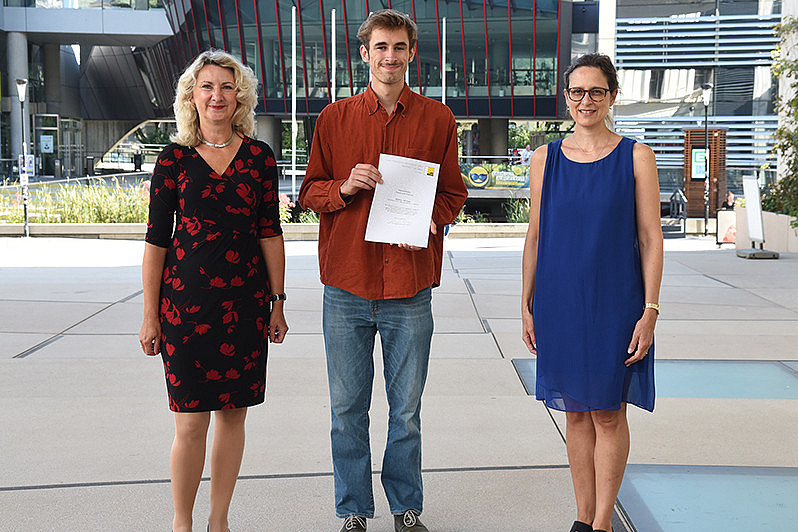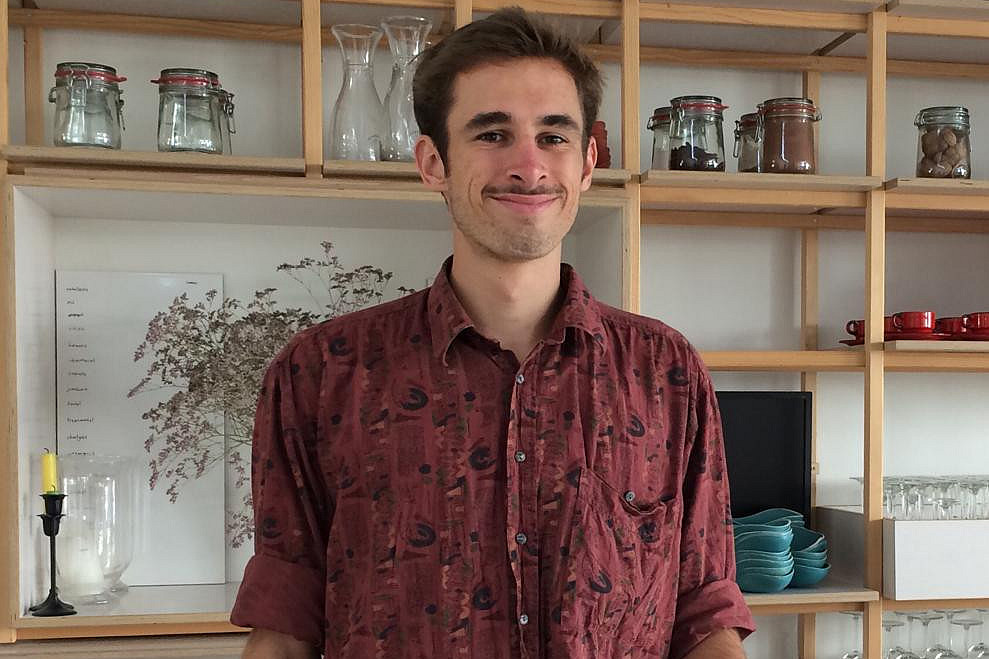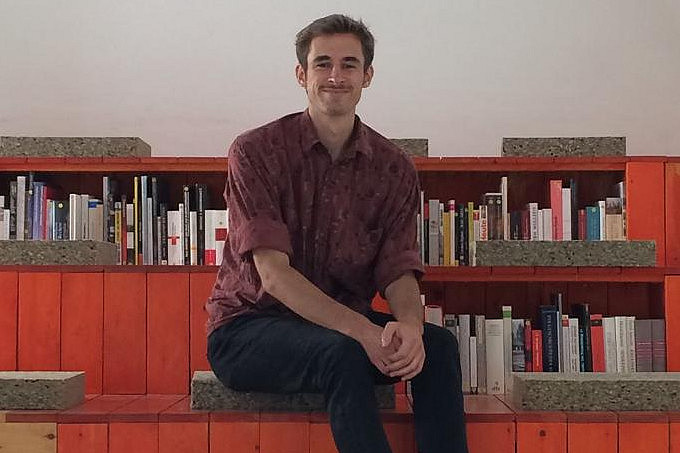Two years ago, we launched the “Certificate in Intermediality: Theory and Practice” for B.A. students in the Faculty of Arts and Humanities. The CIMIG proudly announces that the first student to complete the requirements and receive the certificate is Michael Meister, BA, who kindly agreed to be interviewed for our website. The center’s director, Univ.-Prof. Dr.phil Nassim Balestrini, had the pleasure of asking our first alumnus a few questions regarding his overall experience with fulfilling the certificate requirements and with the internship, which is offered as an alternative to a seminar. We hope this comprehensive interview will provide all readers, and particularly current as well as future certificate candidates, with an in-depth perspective on the “Certificate in Intermediality.” Also check out the news item and video on the university homepage at Grenzgenial - Das Online-Magazin der Uni (uni-graz.at).
Nassim Balestrini: Why did you choose to pursue this certificate? / What influenced your decision to sign up and complete this certificate?
Michael Meister: To be honest, I stumbled across the certificate by chance because I could choose the Intermediality Theory I PS as a mandatory subject in my BA degree. It drew my interest because I had previously analyzed a Gorillaz song for my BA thesis which brimmed with references to literature. Reading through the course description I realized that an intermedial approach could have provided a useful theoretical framework for my analysis and interpretation. Although I enjoyed working on the thesis, I occasionally struggled with doubts that what I was doing was not properly scientific, worries I perhaps would not have had if I had known about intermediality theory. I eventually signed up for the certificate to gain the theoretical knowledge that could have made my analysis and interpretation more profound and because I was eager to explore the research area that I touched upon in my BA thesis further.
NB: What was/were your favorite class(es) in the certificate? Why?
MM: It is definitely hard to choose a favorite because each class allowed me to analyze and work with an example that I could choose myself, which I always enjoyed. As far as the overall experience is concerned, I would choose the Intersections of Photography and Film seminar as a highlight because I noticed that a lot of work and studying seemed to come together. I came up with an idea for my seminar paper thanks to my internship at the Grazer Kunstverein, which showed an exhibition concerned with racial passing and I could quickly develop my idea into a sound thesis with the knowledge I had accumulated in the proseminars from the first module. I was a bit nervous heading into this seminar because my knowledge about films and my experience working with them was limited. However, I fondly remember the class for the same reason because despite being delivered online, I could learn a lot from the lively discussions with my fellow students and eventually benefitted from this experience a lot.
NB: How has intermediality theory helped you gain a new perspective on your main field of study?
MM: Coming from the field of English and American Studies I had previously mostly worked with literary texts. One main takeaway from the certificate is that my field of study is not restricted to specific media, but is even wider than expected, encompassing, for example, the visual arts and games. During my first semesters at university, I sometimes had the impression that English and American studies was mostly about reading and discussing an established literary canon and I would say that I dare to think more outside the box now, especially when it comes to the discipline of cultural studies.
NB: What knowledge that you gained from the certificate will you take with you as you continue with your Master’s degree? / How does the certificate prepare you for your Master’s degree?
MM: I mostly feel like I have become more efficient developing and writing theses, which I can certainly benefit from in my MA. I have become familiar with a wide range of definitions from the field of intermediality and transmediality research and even though I may not remember all the terminology and theorists by heart, I have learned to use the theories as analytical tools that I can apply to new contexts. Although I cannot tell at this point in which direction my research interests will develop throughout my MA, I am sure that it will be helpful to keep what I have learned in mind.
NB: How did your experiences at your internship influence your understanding of intermediality?
MM: Doing the internship at the Grazer Kunstverein definitely made intermediality more tangible for me and made me aware of its omnipresence in contemporary art, which is often strongly interdisciplinary. Particularly the spring exhibition which dealt with racial passing drew my attention to the area of transmediality studies because it pointed out to me how this theme had been realized across different media in the past while at the same time presenting the issue in a new way by merging different media together. The internship also provided me with points of reference that helped me follow and makes sense of theoretical debates that we touched upon in the seminars, for example, the one about the post-media age. The mixture of media used in the spring exhibition provided me with a concrete example that helped me understand the abstract condition that I was supposed to lead a discussion on in class. Without my experience in the internship, I would not have been able to explain this phenomenon as clearly.
NB: How has your internship experience prepared you for applying intermedial ways of thinking outside academia?
MM: As I have already said, I believe that intermediality is a condition quite natural to contemporary art and studying it has really changed the way I approach exhibitions and individual pieces of art. Previously, I did not really pay attention to the medium that was used to address a certain issue or depict a certain subject. Now I know that the choice of medium is something that pretty much defines an artist’s possibilities in the first place, in a sense of the extent to which a piece of art can immerse its recipient or engage their imagination. I have also come to appreciate adaptations and digital remediations of traditional art and discovered that deviations from the original can be quite innovative and do not necessarily entail a devaluation of the original. In this sense, I would say that I can approach such works more openly and objectively now. My experience in the internship has, moreover, helped me to be more patient with profound works of art, which require you to puzzle out its meaning. Knowing about intermediality has sort of given me an analytical gaze that draws my attention to the single constituents of a work, not just the whole.
NB: What do you wish you would have known when starting the certificate in intermediality?
MM: When I started the certificate, it was all quite new and even though I did know, for example, that there was the possibility to do an internship, I had no further details what it might look like. This was not really a problem because when I inquired about it, I was quickly forwarded to the Grazer Kunstverein. Still, I feel like knowing about the possible partner institutions for an internship in advance can act as a strong incentive, especially in the case of the Grazer Kunstverein for people who want to get an insight into the art scene and working in the cultural sector. Otherwise, I must admit that I was easily convinced by the single courses on offer, and I merely skimmed the certificate flyer before I started. Looking at it in retrospect, I think that it sums up the benefits and main takeaways from the certificate really well.
NB: What advice to you have for students who are interested in the certificate?
MM: I would advise them not to be intimidated by the title of the Intermediality Theory I proseminar. It’s quite abstract and may sound a bit uninviting compared to other classes, especially for students of English and American studies, who have already had relatively theory-loaded intro classes in literary studies in their first few semesters. Well, the proseminar and, in fact, most of the certificate is doubtlessly theory-loaded as well, but I would like to point out that there are many opportunities to discuss one’s own examples, which can be really satisfying and is not possible to the same extent in other classes. I would also advise students to visit the proseminar and the lecture simultaneously because it really helped me digest and permanently memorize the presented information.
NB: Do you have any additional comments regarding your experience?
MM: In my opinion it was a positive experience to delve into a specific area within the vast field of the humanities. Previously, I had felt like having to start from scratch with each new class and I appreciated the chance to deepen my knowledge in the field of intermediality. The BA student experience can be quite overwhelming at times, especially these last few semesters, and it was simply nice to find something familiar in new classes and watch yourself become sort of an expert.


